If you’re looking for the best portable ECG monitors, I recommend devices like the EMAY 6L, KardiaMobile 6-Lead, and Beurer Cardio Companion. These models offer quick, accurate readings and easy Bluetooth connectivity for smartphones or PC use. They’re compact, user-friendly, and perfect for continuous heart health tracking at home or on the go. Keep exploring to discover which one fits your needs and how they can help you stay proactive about your heart.
Key Takeaways
- Many devices support Bluetooth and USB connectivity for seamless data transfer to smartphones and PCs.
- Compact, lightweight designs make these ECG monitors highly portable for daily use and travel.
- Features like quick 30-second measurements and multiple modes enable easy and comprehensive heart health tracking.
- App integrations provide data storage, sharing, trend analysis, and arrhythmia detection for user-friendly monitoring.
- Compatibility varies, with most devices suitable for personal use but limited support for pacemakers or implanted devices.
EMAY 6L Portable ECG Monitor
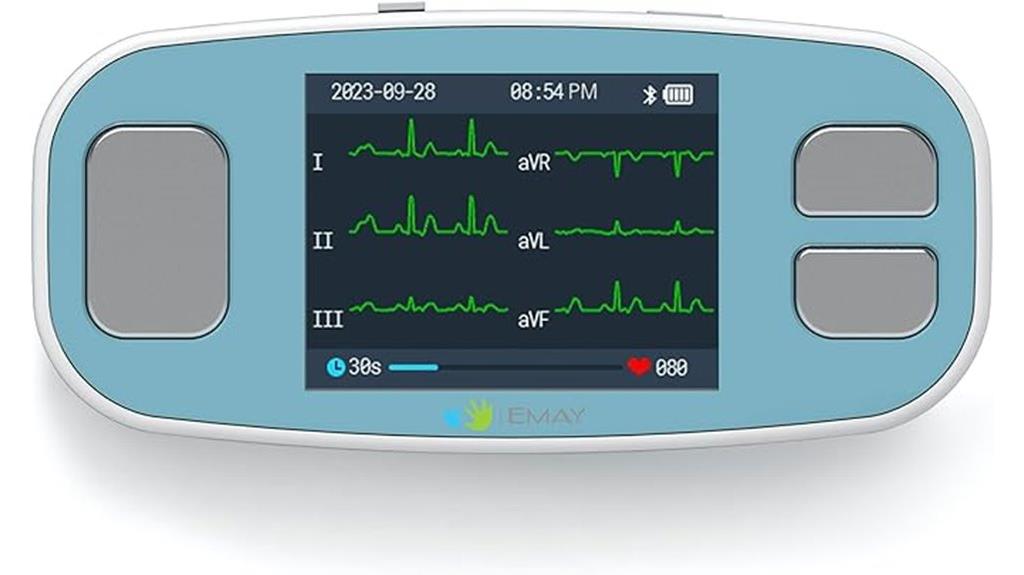
If you’re looking for a portable ECG monitor that’s easy to use at home, the EMAY 6L is an excellent choice. It records and stores ECG signals while showing your heart rate clearly. Supporting 6-channel ECG recordings, it connects seamlessly to your smartphone via Bluetooth or to your PC with a USB cable. The device is powered by a rechargeable battery, making it convenient for daily use. Designed for over-the-counter use, it’s perfect for personal health tracking, though it’s not a substitute for clinical devices. Best of all, there are no hidden costs or subscriptions—just reliable, user-friendly heart monitoring at your fingertips.
Best For: individuals seeking a portable, user-friendly ECG monitor for personal health tracking at home without the need for clinical-grade equipment.
Pros:
- Supports 6-channel ECG recording with clear heart rate display.
- Compatible with both smartphones via Bluetooth and PCs via USB, ensuring flexible connectivity.
- No subscription fees or hidden costs, making it cost-effective for everyday use.
Cons:
- Not suitable for use with implanted pacemakers.
- Designed for over-the-counter use and not a substitute for professional medical diagnostic devices.
- Limited to personal and home health monitoring, not intended for clinical diagnosis.
EMAY Portable ECG Monitor for Heart Rate and ECG Recording

The EMAY Portable ECG Monitor is an excellent choice for individuals seeking an easy, reliable way to track their heart health at home. It records and stores Lead I ECG signals and displays heart rate, making it simple to monitor your condition daily. The device connects seamlessly to smartphones via Bluetooth and to PCs via USB, allowing for easy data management. Its software includes features like sample mode, case upload, review, and measurement functions, supporting convenient health tracking. Powered by a rechargeable lithium battery, it’s designed specifically for personal use, offering a practical solution for non-professional, at-home heart monitoring.
Best For: individuals looking for an easy, reliable way to monitor their heart health at home without professional medical equipment.
Pros:
- User-friendly design suitable for non-professional, personal use.
- Compatible with both smartphones and PCs for flexible data management.
- Portable and powered by a rechargeable battery, ideal for daily monitoring.
Cons:
- Not intended for use with implanted pacemakers or for medical diagnosis.
- Limited to Lead I ECG signals, which may not provide comprehensive diagnostic information.
- Designed primarily for OTC personal health monitoring, not for clinical or professional medical settings.
KardiaMobile 6-Lead Personal EKG Monitor
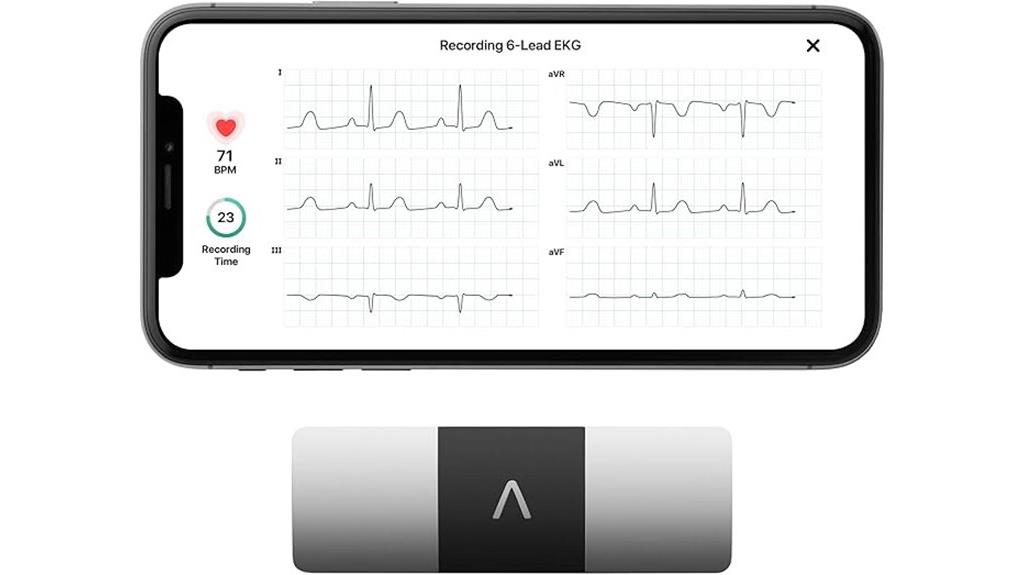
For those seeking detailed heart data in a portable, easy-to-use device, the KardiaMobile 6-Lead Personal EKG Monitor stands out as an ideal choice. It offers six-lead ECG readings that provide richer, more accurate data than single-lead options, helping detect arrhythmias like AFib, Bradycardia, and Tachycardia within 30 seconds. Compact and lightweight, it connects seamlessly to most smartphones and tablets via the free Kardia app. Trusted by medical professionals, it delivers FDA-cleared, clinical-grade results that can be shared easily. Perfect for ongoing monitoring, it’s a practical, reliable device for anyone wanting detailed heart insights on the go.
Best For: individuals seeking detailed, clinical-grade heart monitoring that is portable, easy to use, and compatible with most smartphones and tablets.
Pros:
- Provides six-lead ECG readings for richer, more accurate heart data than single-lead devices
- FDA-cleared and trusted by medical professionals for reliable, clinical-grade results
- Compact, lightweight design and easy sharing options make it suitable for ongoing monitoring and travel
Cons:
- Requires holding the device steady against fingers and leg, which may need practice for clear waveforms
- Deleting ECG files can be challenging, potentially leading to large data storage issues
- Lacks chest leads and has some signal noise susceptibility, limiting its use as a standalone diagnostic tool
Beurer Cardio Companion EKG Monitor
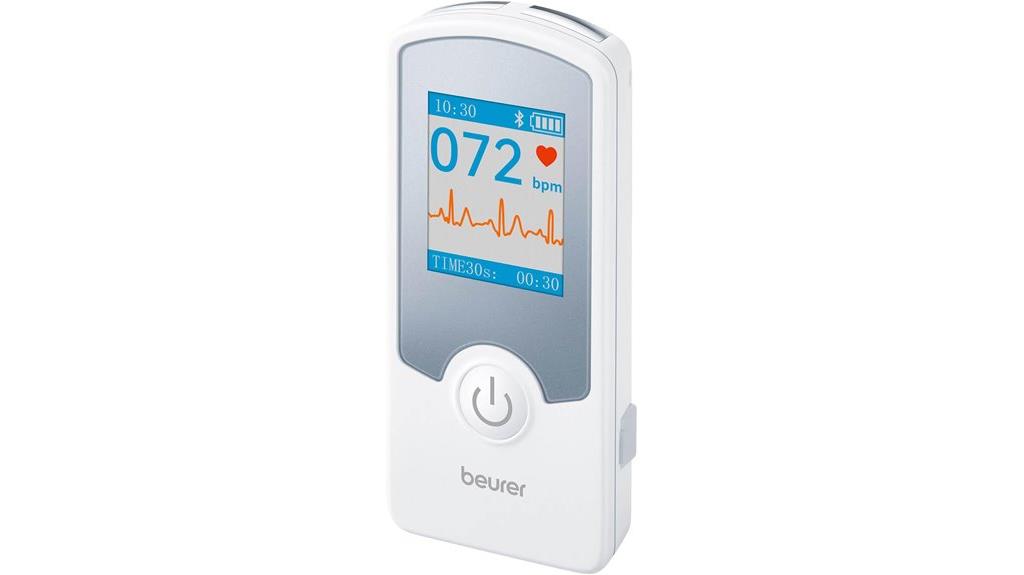
The Beurer Cardio Companion EKG Monitor stands out as an excellent choice for individuals seeking a reliable, portable device to monitor their heart health at home. Its compact, German-engineered design and FDA clearance guarantee accurate, real-time heart rhythm measurements in under 30 seconds. With multiple measurement options, including finger-to-chest for superior accuracy, it’s easy to use and dependable. The bright color display shows clear results, while Bluetooth connectivity syncs seamlessly with a free app for unlimited data storage and trend tracking. Whether monitoring arrhythmia or general heart health, I find it to be a convenient, trustworthy tool for ongoing heart care.
Best For: individuals seeking a portable, accurate, and easy-to-use device for ongoing heart health monitoring at home.
Pros:
- Compact, portable, and German-engineered design for convenience and durability
- Provides quick, reliable 3-lead ECG readings in under 30 seconds with FDA clearance
- Seamless Bluetooth connectivity with a free app for unlimited data storage and trend analysis
Cons:
- Not suitable for use by individuals with pacemakers or metal implants
- Does not detect heart attacks or provide comprehensive diagnostic data
- Requires proper contact and positioning to ensure measurement accuracy
EKG Monitor Device, Personal Heart Rate Monitor with LCD Screen
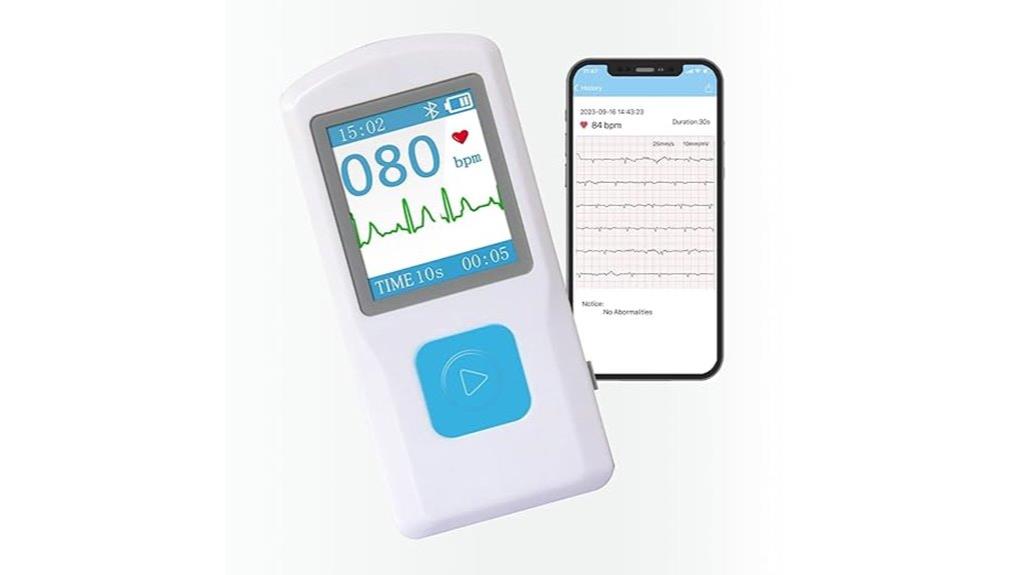
If you’re looking for an easy, reliable way to monitor your heart health on the go, the EKG Monitor Device with its LCD screen is an excellent choice. It offers instant 30-second ECG results and stores professional-grade data, helping you detect issues early. The device is simple to use—just place your hands on it for accurate readings—and features multiple modes like Hand to Hand, Hand to Chest, and Hand to Leg for thorough assessments. Compact and lightweight at only 60g, it’s perfect for daily use or travel. Plus, it connects easily to smartphones or computers via Bluetooth or cable, making data sharing quick and effortless.
Best For: individuals seeking a portable, easy-to-use device for real-time heart health monitoring and early detection of potential heart issues.
Pros:
- Quick and accurate 30-second ECG results for efficient monitoring
- Compact, lightweight design (only 60g) ideal for daily use and travel
- Compatible with smartphones and computers for seamless data sharing and management
Cons:
- May require familiarity with mobile or computer interfaces for optimal use
- Limited to personal use; not a substitute for professional medical diagnosis
- Battery life may need monitoring with frequent use in active settings
FL20 Portable ECG/EKG Monitor, MD100B

The FL20 Portable ECG/EKG Monitor, model MD100B, is ideal for individuals who want quick, at-home heart monitoring without the need for professional equipment. It’s small, lightweight, and features a 12 cm backlit LCD display that shows ECG waveforms, heart rate, analysis results, and battery status. With just 30 seconds, you get rapid measurements, and it can record 24-hour ECG strips. The device stores up to 200 records and allows data transfer to a PC via USB. Powered by a lithium-ion battery, it offers 24 hours of continuous use. It’s a practical choice for basic wellness monitoring, though some users question its build quality and software reliability.
Best For: individuals seeking an affordable, portable, and easy-to-use device for basic at-home heart monitoring and peace of mind without professional medical features.
Pros:
- Quick and painless measurement process providing results in 30 seconds
- Compact, lightweight design suitable for home or on-the-go use
- Stores up to 200 records and supports data transfer to a PC via USB
Cons:
- Outdated software interface with limited analysis features
- Reports of build quality issues and potential hardware defects
- Small buttons may be difficult for seniors or users with limited dexterity
Aproca Hard Travel Storage Case for EMAY Portable ECG Monitor
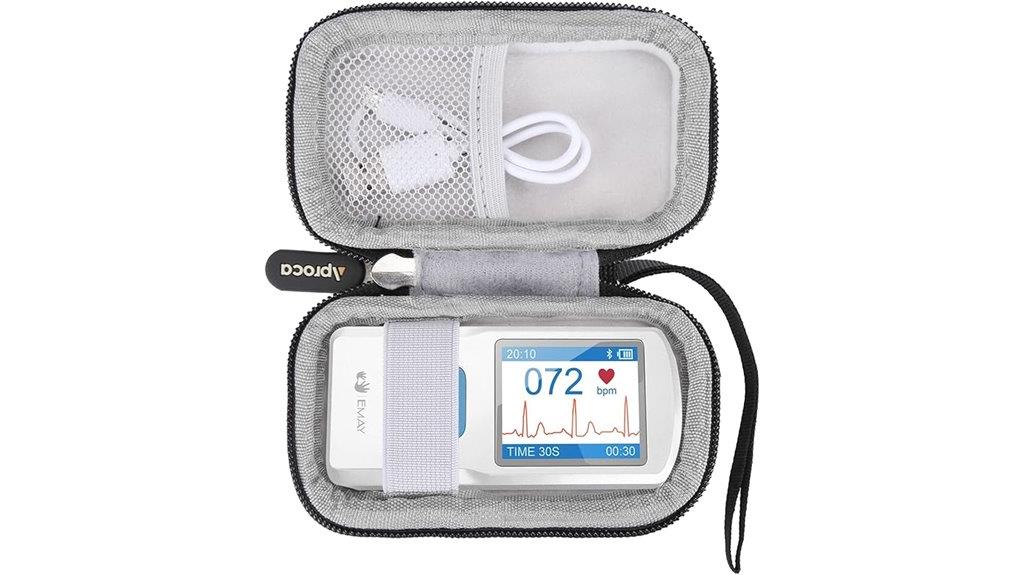
Designed specifically for EMAY and CONTEC PM10 portable ECG monitors, the Aproca Hard Travel Storage Case offers a secure and durable solution for anyone needing reliable protection during transport. Made from eco-friendly high-density EVA and 1680D material, it ensures long-lasting performance and style. The case features a comfortable hand strap, a mesh pocket for accessories, and an elastic strap to hold your device securely. Its smooth double zipper makes opening and closing effortless. Compact at 4.2 x 3.8 x 1.3 inches and weighing just over 2 ounces, it’s perfect for travel, outdoor use, or everyday protection. Customers love its fit, protection, and portability.
Best For: individuals seeking a durable, secure, and portable storage solution for their EMAY or CONTEC PM10 portable ECG monitors, especially for travel or outdoor use.
Pros:
- Made from eco-friendly high-density EVA and 1680D material for durability and style
- Features a comfortable hand strap, mesh accessory pocket, and elastic strap for secure fit and convenience
- Compact, lightweight design weighing just over 2 ounces, ideal for travel and outdoor activities
Cons:
- Listing includes only the empty case; devices and accessories are not included
- Some users may find the price high compared to similar cases
- Limited interior space may not accommodate additional accessories beyond the ECG monitor
KardiaMobile 6L Max Personal EKG Monitor with 12-Month Subscription
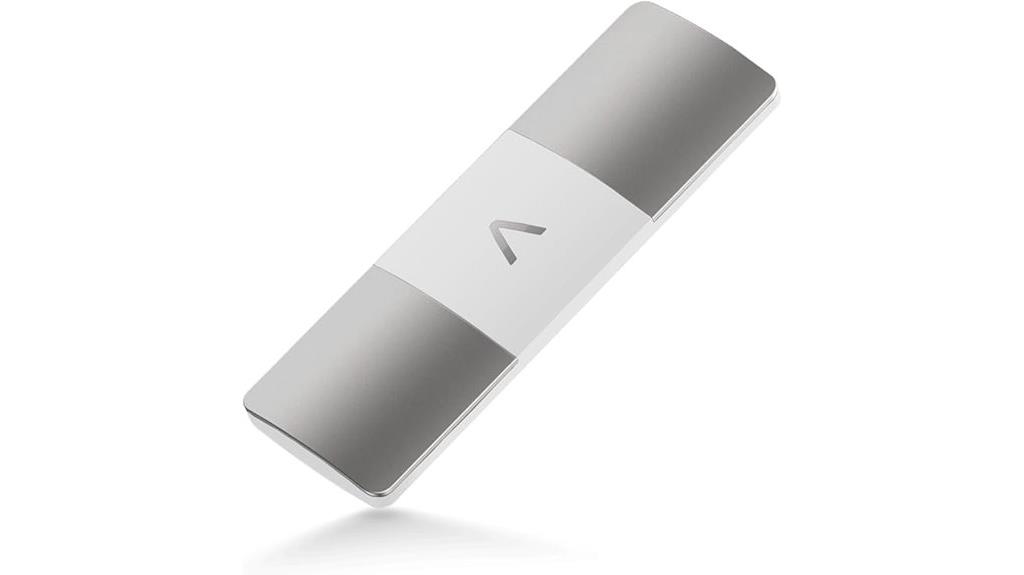
The KardiaMobile 6L Max Personal EKG Monitor is ideal for individuals who want quick, accurate heart rhythm assessments on the go. It’s compact, durable, and records 6-lead ECGs in about 30 seconds, detecting six common arrhythmias, including AFib. The device pairs seamlessly with a user-friendly app that offers detailed insights, trend analysis, and easy sharing with healthcare providers. The included 12-month subscription provides AI-generated reports and cardiologist reviews within 24 hours, boosting confidence in your results. Weighing just 24 grams, it fits comfortably in your hand or pocket, making heart monitoring straightforward, reliable, and convenient anywhere you need it.
Best For: individuals seeking a portable, accurate personal EKG device with professional-level analysis and easy sharing capabilities for ongoing heart rhythm monitoring.
Pros:
- Compact, lightweight design weighing only 24 grams, making it highly portable and convenient for on-the-go use.
- Detects six common arrhythmias with quick 30-second recordings, providing comprehensive heart rhythm insights.
- Includes a 12-month subscription with AI-generated reports and cardiologist reviews within 24 hours, enhancing diagnostic confidence.
Cons:
- Battery replacement can be challenging, requiring tools and manual dexterity.
- Not compatible with pacemakers or ICDs, limiting use for some patients.
- Requires a smartphone and app for full functionality, which may not be suitable for users without compatible devices.
KardiaMobile 1-Lead EKG Monitor
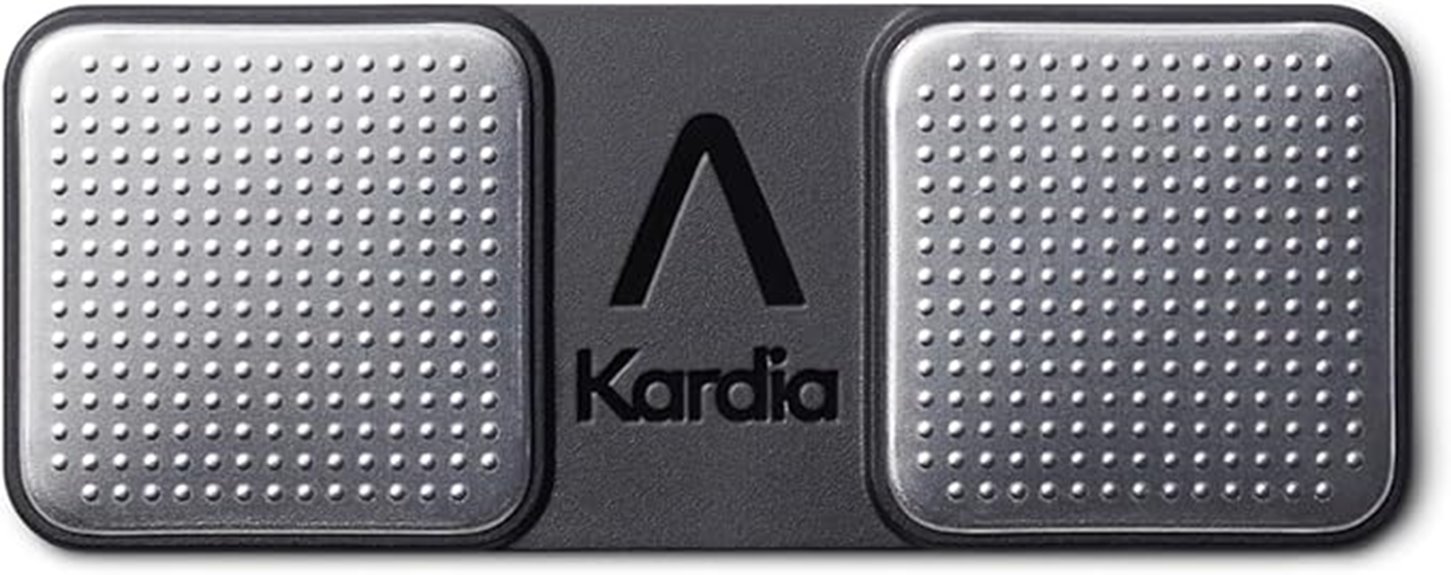
If you need a quick, accurate way to monitor your heart health on the go, the KardiaMobile 1-Lead EKG Monitor is an excellent choice. It’s compact—just 3.27 inches long—and weighs only 18 grams, making it easy to carry in your pocket. The device provides medical-grade EKG recordings in just 30 seconds, with instant analysis on your smartphone. Compatible with most devices, it detects atrial fibrillation, bradycardia, tachycardia, and normal rhythms without a subscription. Easy to use—simply place your fingers on the sensors—and the results can be emailed or saved. Highly recommended by healthcare professionals, it’s a reliable tool for heart monitoring.
Best For: individuals seeking a portable, quick, and accurate personal EKG monitor to track heart health on the go without the need for a subscription.
Pros:
- Compact and lightweight design easily fits in pockets for on-the-go use
- Medical-grade EKG recordings in just 30 seconds with instant smartphone analysis
- Detects atrial fibrillation, bradycardia, tachycardia, and normal rhythms without a subscription
Cons:
- Not suitable for use with pacemakers or ICDs
- Does not detect heart attacks
- Requires compatible smartphones or tablets and the Kardia app for operation
EverOne Portable Bluetooth ECG/EKG Monitor (EVOPM10)

For anyone seeking a convenient, wire-free way to monitor their heart health on the go, the EverOne Portable Bluetooth ECG/EKG Monitor (EVOPM10) stands out as an excellent choice. Its compact size and lightweight design make it easy to carry and use anywhere. The device measures heart rate and rhythm quickly—results appear within 10-30 seconds—and can be wirelessly transmitted via Bluetooth to your smartphone, tablet, or PC. Compatible with iOS, Android, and Windows, it requires no wires or electrodes, just simple placement on your chest, wrists, or ankles. The free app and PC software make data sharing and storage straightforward, supporting ongoing heart health tracking.
Best For: individuals seeking a portable, wire-free ECG/EKG monitoring device for quick, on-the-go heart health assessments compatible with multiple devices.
Pros:
- Compact and lightweight design for easy portability and discreet use
- Wireless Bluetooth connection allows seamless data transfer to smartphones, tablets, and PCs
- Fast measurement results within 10-30 seconds, with no need for wires or electrodes
Cons:
- Requires compatible smartphones or tablets with Bluetooth and app installation for full functionality
- Limited to basic heart rate and rhythm monitoring without advanced diagnostic features
- Battery life supports up to 500 measurements, which may require frequent recharging with extensive use
KardiaMobile Card Personal EKG Device

Designed for people who need quick and reliable heart monitoring on the go, the KardiaMobile Card Personal EKG Device is a sleek, credit card-sized tool that fits easily into my wallet. It’s thin, lightweight, and durable, making it perfect for portable use. No WiFi is needed—just Bluetooth to connect with my smartphone or tablet. I can record medical-grade single-lead EKGs in seconds by placing my thumbs or fingers on the sensors. It accurately detects arrhythmias like AFib, Bradycardia, Tachycardia, and normal rhythms. FDA-cleared and doctor-recommended, it offers dependable heart tracking anytime, anywhere, without extra subscriptions for core features.
Best For: individuals who need quick, reliable, and portable heart monitoring on the go without the hassle of subscriptions or WiFi.
Pros:
- Compact, credit card-sized design easily fits in a wallet for portability
- FDA-cleared and doctor-recommended for medical-grade accuracy
- No subscription required for core heart rhythm detection features
Cons:
- Additional features and detections require a paid KardiaCare subscription
- Limited to single-lead EKG recordings, which may be less comprehensive than multi-lead devices
- Compatibility depends on smartphone or tablet, requiring Bluetooth connection
LTGEM Hard Case Compatible with EMAY 6L Portable ECG Monitor (Case Only)
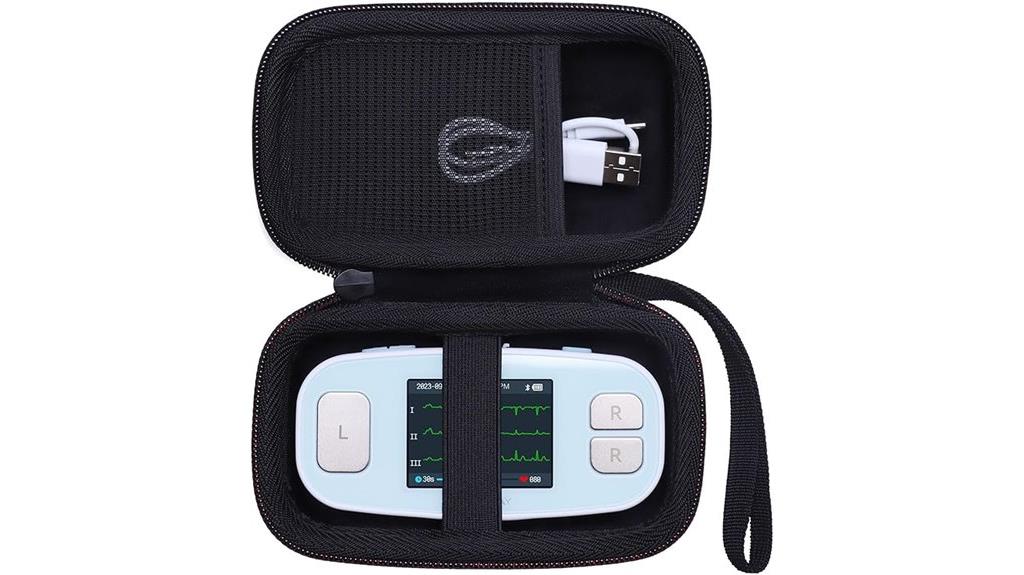
The LTGEM Hard Case is an ideal accessory for anyone who needs to protect their EMAY 6L Portable ECG Monitor during travel or storage. Designed specifically for this device, it offers a snug fit with dimensions of 5.8 by 3.5 by 2.2 inches, ensuring secure storage. Made from durable EVA and velvet, it provides excellent impact and scratch resistance. The sturdy rubber handle makes it easy to carry, while the smooth double zippers allow quick access. With high customer ratings for fit and protection, this lightweight case is perfect for safeguarding your monitor on the go, whether for medical appointments or daily travel.
Best For: individuals needing a secure, portable protective case for their EMAY 6L Portable ECG Monitor during travel, storage, or medical appointments.
Pros:
- Custom-fit design ensures secure and snug placement of the ECG monitor.
- Made from durable EVA and velvet for impact and scratch resistance.
- Lightweight and equipped with a sturdy rubber handle for easy portability.
Cons:
- Limited color options may not appeal to all aesthetic preferences.
- Does not enhance device functionality or reading accuracy.
- Slightly compact dimensions might be tight for additional accessories or cables.
Portable 12-Lead Heart Monitor with AI Analysis
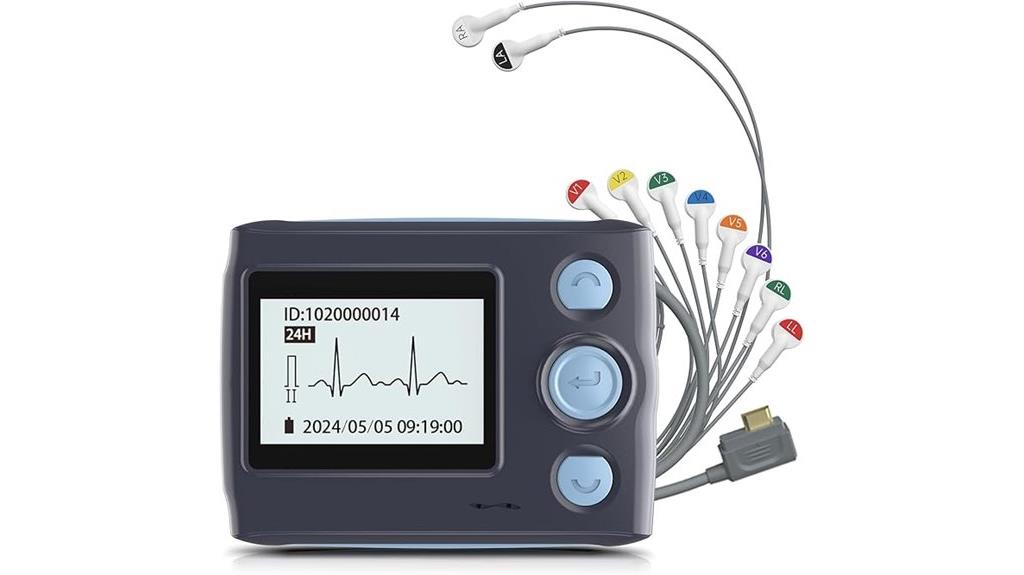
If you’re looking for a portable ECG device that offers detailed 12-lead recordings with AI-powered analysis, the TH12 model stands out as an excellent choice. It provides 24-hour continuous monitoring with simultaneous 12-lead ECGs, supporting accurate detection of heart abnormalities across 17 categories. The device features a clear LCD screen for real-time viewing and is compatible with both Mac and Windows computers. Compact and lightweight at just 62 grams, it’s designed for home use and easy portability. The included software allows you to manage reports, share records, and generate PDFs, making heart health tracking straightforward and accessible.
Best For: tech-savvy individuals and healthcare professionals seeking portable, detailed 12-lead ECG monitoring with AI analysis for home use.
Pros:
- Supports 24-hour continuous recording with simultaneous 12-lead ECGs for comprehensive monitoring
- Compatible with Mac and Windows, facilitating easy report management and sharing
- Lightweight and portable at only 62 grams, ideal for home and on-the-go use
Cons:
- Software interface is outdated and difficult to navigate, which can hinder user experience
- Support services have been reported as unhelpful, complicating troubleshooting efforts
- Mixed customer reviews indicate variability in user satisfaction and ease of use
Portable Heart Rate Monitor with Smartphone App for iOS & Android
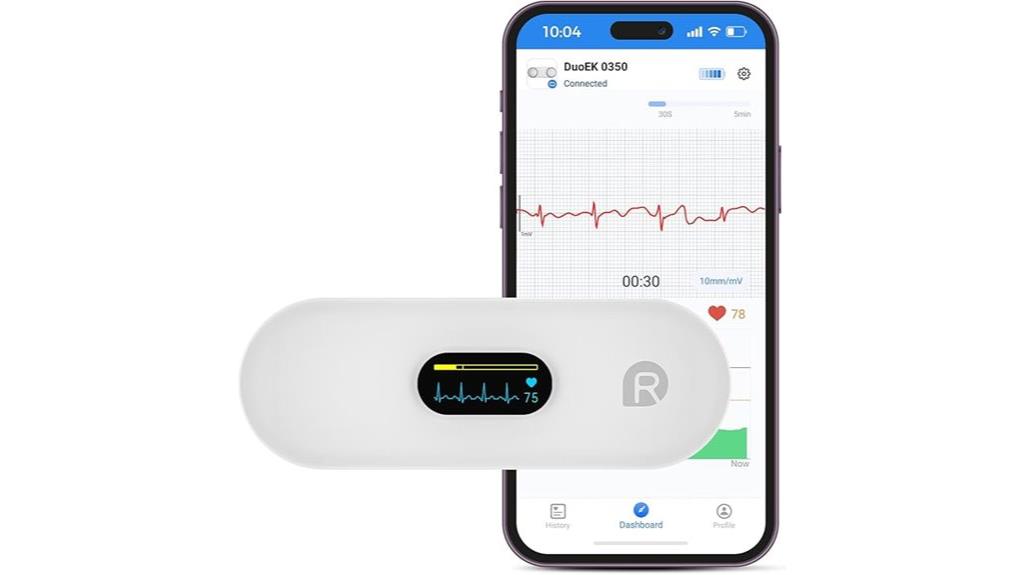
Looking for a quick and reliable way to monitor your heart rhythm at home? The OVIIN Portable Heart Rate Monitor is perfect. It’s wireless, compact, and compatible with both iOS and Android smartphones. Simply place your fingers on the sensors for 30 seconds, and it captures high-accuracy heart rate data. The OLED screen shows your rhythms instantly, no phone needed. Connect it to the app to record, track, and share results with your doctor easily. With a rechargeable battery supporting 500 sessions, it’s designed for everyday use. This device offers a straightforward way to stay on top of your heart health effortlessly.
Best For: individuals seeking a portable, easy-to-use heart rate monitor for at-home health tracking that seamlessly connects to their smartphone.
Pros:
- Quick and accurate heart rate readings in just 30 seconds without complicated setup
- Compatible with both iOS and Android devices, with easy app connectivity for tracking and sharing data
- Compact, durable design with a rechargeable battery supporting up to 500 sessions
Cons:
- Customer ratings are moderate at 3.9 out of 5 stars, indicating some user variability in satisfaction
- Limited to 1-inch OLED screen, which may be small for some users to view easily
- The device relies on sensor placement; improper use could affect data accuracy
Factors to Consider When Choosing a Portable ECG Monitor Device
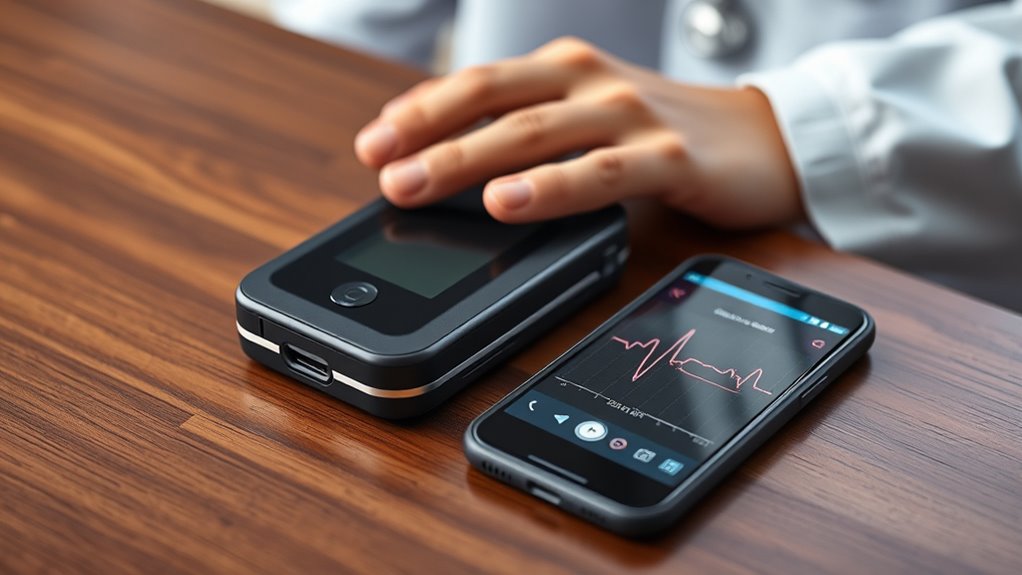
When selecting a portable ECG monitor, I look at how well it works with my devices, like my phone or tablet. I also consider battery life, how accurate the readings are, and how easy it is to use and store data. These factors help guarantee I get reliable results without hassle.
Compatibility With Devices
Ensuring your portable ECG monitor is compatible with your devices is crucial for smooth operation and data management. First, check that it works with your smartphone’s operating system, whether iOS or Android, for easy app access. Confirm the connection type—Bluetooth, USB, or Wi-Fi—and ensure your device supports it. Also, verify compatibility with your computer or tablet, paying attention to system requirements like Windows or Mac OS versions. Reviewing the manufacturer’s compatibility list can save you from surprises, especially for specific models. Additionally, consider whether the necessary apps or software are free or require purchase, as this impacts your overall experience. Compatibility ensures seamless data transfer, easy monitoring, and integration into your existing device ecosystem.
Battery Life Durability
A portable ECG monitor’s battery life is a key factor that directly impacts its usability and reliability. A longer battery life means I can perform multiple recordings throughout the day without needing to recharge constantly, which is incredibly convenient for daily monitoring. Durable battery performance ensures the device works consistently over time, reducing the risk of power loss during critical measurements. Devices with rechargeable lithium batteries typically last around a year with proper care, supporting regular health tracking. The ability to support hundreds of measurements per charge, like 500 sessions or more, indicates high durability and trustworthiness. A well-designed battery minimizes degradation over time, maintaining performance and reducing the need for replacements or repairs, which is essential for ongoing heart health management.
Measurement Accuracy
How do you guarantee that a portable ECG monitor provides dependable readings? First, look for devices with FDA or equivalent clearance, which ensures clinical reliability and accuracy. Multi-lead models, like 6-lead or 12-lead, tend to offer more thorough and precise data compared to single-lead options. Proper contact with your skin and correct electrode placement are essential for accurate results, so choose devices with clear instructions. Regular calibration and software updates are also key to maintaining measurement consistency over time. Remember, high accuracy is crucial for detecting arrhythmias and other heart issues reliably. By prioritizing these factors, you can confidently select a device that delivers trustworthy readings, helping you monitor your heart health effectively.
Data Storage Options
When choosing a portable ECG monitor, considering the available data storage options is essential for managing your heart health effectively. Many devices offer internal storage for a limited number of recordings, from just a few to hundreds of files. Some monitors let me upload or export data to my computer or cloud services via USB, Bluetooth, or Wi-Fi, enabling longer-term storage and analysis. I also appreciate devices that generate downloadable PDFs or reports, which I can save or share with my healthcare provider. The storage capacity often influences how well the device can track heart health trends over time without needing external tools. Devices with expandable memory or integration with companion apps provide more flexible options, making long-term monitoring more seamless and extensive.
Ease of Use
Choosing a portable ECG monitor that’s easy to use can make managing your heart health much more straightforward. A user-friendly device should have simple operation steps, like placing fingers on sensors or using minimal buttons, so you get quick, accurate readings without hassle. Clear, large-font displays and straightforward interfaces help you interpret results easily, reducing confusion. Seamless connectivity via Bluetooth or USB, combined with intuitive mobile apps or software, makes data transfer and review effortless. Pre-programmed measurement modes, such as hand-to-hand or hand-to-chest, cut down setup time and lower the chance of user errors. Additionally, a compact, lightweight design ensures you can operate the device comfortably in various settings, making daily heart monitoring less of a chore and more accessible.
Portability Features
To guarantee your portable ECG monitor fits seamlessly into your daily routine, prioritize models that are lightweight and compact enough to carry in a pocket, bag, or case. A smaller size ensures easy handling during quick setups and reduces the risk of damage. Look for devices with durable, impact-resistant casings that can withstand outdoor use and transportation. Wireless connectivity options like Bluetooth or Wi-Fi are essential, as they allow data transfer without cumbersome cables, boosting convenience. An included protective case or pouch adds extra security, shielding your device from scratches, impacts, and environmental factors. Overall, choosing a device with these portability features ensures you can monitor your heart health effortlessly, whether at home, work, or on the go.
App Functionality
A vital aspect of selecting a portable ECG monitor is ensuring the accompanying app offers robust and user-friendly functionality. I look for apps that provide comprehensive features like easy case upload, review, measurement, and data sharing, so I can track my heart health effectively. Compatibility with my smartphone or PC, whether iOS, Android, Windows, or Mac, is essential. I prefer apps that allow seamless exporting of ECG data as PDFs or other formats to share with my healthcare provider effortlessly. User-friendly interfaces, instructional tutorials, and reliable data storage without requiring subscriptions for core functions are important. Additionally, features like symptom tracking, trend analysis, and notifications help me stay proactive about my heart health and make monitoring more convenient.
Price and Costs
When evaluating portable ECG monitors, I find it essential to take into account the total costs involved beyond just the initial purchase price. While some devices are budget-friendly under $100, others, especially professional-grade models, can cost several hundred dollars. I also consider subscription services that offer advanced features, AI analysis, or professional reviews, which can add ongoing expenses. Additional accessories like protective cases or electrodes might be necessary and increase costs over time. I compare app compatibility—some come with free apps, while others charge for premium features or extra data storage. Finally, I think about maintenance costs, such as battery replacements or hardware upgrades, to ensure I understand the full financial picture over the device’s lifespan.
Frequently Asked Questions
How Accurate Are Portable ECG Monitors Compared to Clinical ECGS?
Portable ECG monitors are quite accurate for detecting common heart issues like arrhythmias, but they’re not as precise as clinical ECGs. I’ve found them useful for regular heart health checks and catching irregularities early. However, if you experience symptoms or need detailed analysis, I recommend consulting a healthcare professional for a full clinical ECG. These devices are great for monitoring, but they shouldn’t replace professional medical evaluations.
Can These Devices Detect All Types of Arrhythmias?
Think of portable ECG monitors as skilled sailors steering your heart’s vast ocean. While they can detect many common arrhythmias—like atrial fibrillation—they might miss rarer, more complex ones. They’re excellent for spotting issues early, but they aren’t foolproof. So, if symptoms persist or are severe, I always recommend consulting a healthcare professional for extensive testing. These devices are great allies, but not a substitute for expert care.
Are Portable ECG Monitors Suitable for Continuous Heart Monitoring?
Yes, portable ECG monitors are suitable for continuous heart monitoring, especially for detecting irregularities over time. I’ve found them incredibly helpful for tracking my heart health consistently, whether I’m at home or on the go. These devices are designed for convenience, providing real-time data that can alert me to potential issues. Just remember, for serious concerns, always follow up with your healthcare professional.
What Is the Recommended Frequency for Using a Portable ECG Device?
I recommend using a portable ECG device at least once a day or whenever I experience symptoms like chest pain or dizziness. Did you know that regular monitoring can catch irregular heart rhythms early, potentially preventing serious issues? I stay consistent by setting reminders on my phone. Using it more frequently during episodes helps me and my doctor understand my heart’s health better and make timely decisions.
Do Portable ECG Monitors Require Medical Training to Operate Effectively?
No, portable ECG monitors don’t require medical training to operate effectively. I find them user-friendly; I just follow the instructions, place the device as directed, and press a button to record my heart activity. These devices are designed for easy use by anyone, whether you’re a healthcare professional or just someone monitoring your own heart health at home. Just make sure to read the user manual carefully.
Conclusion
In the end, choosing the right portable ECG monitor feels a bit like selecting a trusty steed for a modern-day joust—it’s all about reliability and ease. With these devices, you can keep a vigilant eye on your heart health without fuss, much like the noble explorers of yore who charted unknown waters. Remember, the key is finding a device that fits seamlessly into your life, helping you stay vigilant and in control—no matter what era we find ourselves in.









